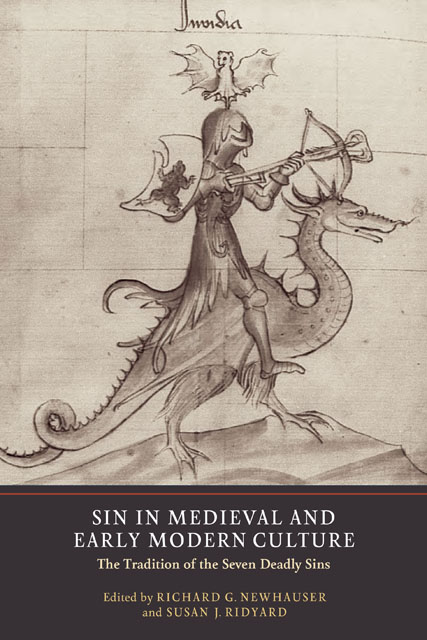13 - Raising Cain: Vice, Virtue and Social Order in the German Reformation
Published online by Cambridge University Press: 28 February 2023
Summary
This essay analyzes a play written in 1553 by the famous Lutheran cobbler-turned-writer, Hans Sachs, called The Unequal Children of Eve. In this play, Adam and Eve have six wicked sons who are presented as personifications of different vices. I argue that Sachs’s play points to the continued vitality of representations of the vices in sixteenth-century German Lutheran culture. In particular, I challenge John Bossy’s argument about the disappearance of the vices in the sixteenth century, a disappearance he argues is particularly evident in German Protestant culture. However, I also demonstrate that Sachs’s treatment of the vices differs from that of his medieval predecessors. In the medieval Catholic tradition on which Sachs drew, representations of the vices served primarily to stimulate and guide examination of the individual conscience. For Sachs (and for his contemporaries) representations of the vices were used to critique ‘antisocial behavior’ and to legitimate social hierarchy.
The story of Cain and Abel is among the most familiar in the Bible. Cain, the eldest son of Adam and Eve, is a ‘tiller of the ground’ and his younger brother Abel is a ‘keeper of sheep’. One day both offer sacrifices to God, Cain from the ‘fruit of the ground’ and Abel from ‘the firstlings of his flock’. God accepts Abel’s offering but rejects Cain’s. Cain kills Abel. But if the story is well-known it is also mysterious. Why does God reject Cain’s offering? Perhaps because Cain offered it grudgingly and out of a sense of duty, not out of love. Perhaps because Abel offered the finest portion of his animals to God while Cain offered the worst portion of his crop. These are plausible explanations, though not ones given explicitly in the text of Genesis. Why does Cain murder Abel? Perhaps because he is jealous of the favor God has shown his younger brother. Plausible, but again, the Bible is not explicit on this point. The pathos and the terseness of the story of Cain and Abel have long exercised the exegetical skillsof theologians and stimulated the imaginative powers of poets. This paper focuses on a particularly striking version of the story of Cain and Abel, a play written in 1553 by the famous Lutheran cobbler-turned-writer, Hans Sachs, called Die ungeleichen Kinder Eve (The Unequal Children of Eve).
- Type
- Chapter
- Information
- Sin in Medieval and Early Modern CultureThe Tradition of the Seven Deadly Sins, pp. 304 - 320Publisher: Boydell & BrewerPrint publication year: 2012



